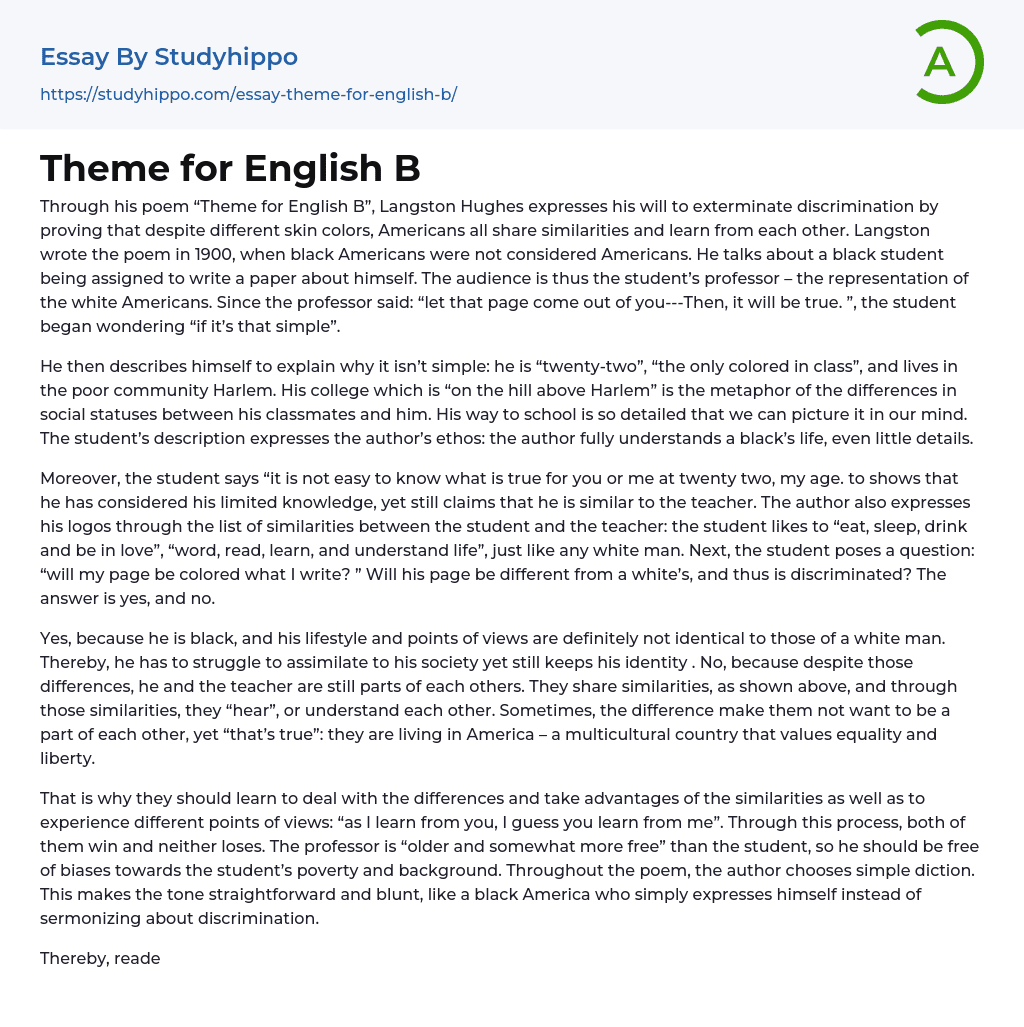Through his poem “Theme for English B”, Langston Hughes expresses his will to exterminate discrimination by proving that despite different skin colors, Americans all share similarities and learn from each other. Langston wrote the poem in 1900, when black Americans were not considered Americans. He talks about a black student being assigned to write a paper about himself. The audience is thus the student’s professor – the representation of the white Americans. Since the professor said: “let that page come out of you---Then, it will be true. ”, the student began wondering “if it’s that simple”.
He then describes himself to explain why it isn’t simple: he is “twenty-two”, “the only colored in class”, and lives in the poor community Harlem. His college which is “on the hill above Harlem” is the
...metaphor of the differences in social statuses between his classmates and him. His way to school is so detailed that we can picture it in our mind. The student’s description expresses the author’s ethos: the author fully understands a black’s life, even little details.
Moreover, the student says “it is not easy to know what is true for you or me at twenty two, my age. to shows that he has considered his limited knowledge, yet still claims that he is similar to the teacher. The author also expresses his logos through the list of similarities between the student and the teacher: the student likes to “eat, sleep, drink and be in love”, “word, read, learn, and understand life”, just like any white man. Next, the student poses a question: “will my page be colored what I write? ” Will his page be different from
a white’s, and thus is discriminated? The answer is yes, and no.
Yes, because he is black, and his lifestyle and points of views are definitely not identical to those of a white man. Thereby, he has to struggle to assimilate to his society yet still keeps his identity . No, because despite those differences, he and the teacher are still parts of each others. They share similarities, as shown above, and through those similarities, they “hear”, or understand each other. Sometimes, the difference make them not want to be a part of each other, yet “that’s true”: they are living in America – a multicultural country that values equality and liberty.
That is why they should learn to deal with the differences and take advantages of the similarities as well as to experience different points of views: “as I learn from you, I guess you learn from me”. Through this process, both of them win and neither loses. The professor is “older and somewhat more free” than the student, so he should be free of biases towards the student’s poverty and background. Throughout the poem, the author chooses simple diction. This makes the tone straightforward and blunt, like a black America who simply expresses himself instead of sermonizing about discrimination.
Thereby, readers can accept the poem’s argument more easily. Furthermore, the author writes the poem mostly in long sentences to emphasize on short yet important sentences such as “That’s America. ”, “Be we are. That’s true! ” The poem has a tied and effective structure. It opens with a familiar scene: a professor asks students to write assignment. However, as the student’s question “I wonder if it’s
that simple” triggers readers’ curiosities, since the assignment seems to be simple.
As the poem progresses, we understand more of the assignment’s difficulties. The conflict comes to the climax at the sentence “will my page be colored what I write? ” and is solved right after that, from line 28 to line 40. To end his argument, the student says: “This is my page for English B”. This ending ties with the beginning, since the teacher told the student to write what is true and important to the student. Thus, the poem appears to be simple, but in fact it is meaningful, well organized and persuasive.
- Academia essays
- Higher Education essays
- Language Learning essays
- Studying Business essays
- Education System essays
- Study essays
- First Day of School essays
- Scholarship essays
- Pedagogy essays
- Curriculum essays
- Coursework essays
- Studying Abroad essays
- Philosophy of Education essays
- Purpose of Education essays
- Brainstorming essays
- Educational Goals essays
- Importance Of College Education essays
- Brown V Board of Education essays
- The Importance Of Higher Education essays
- Online Education Vs Traditional Education essays
- Academic And Career Goals essays
- Academic Integrity essays
- Brown Vs Board Of Education essays
- Distance learning essays
- Technology in Education essays
- Vocabulary essays
- Writing Experience essays
- Importance of Education essays
- Early Childhood Education essays
- Academic Degree essays
- Academic Dishonesty essays
- School Uniform essays
- Academic writing essays
- Cheating essays
- Bachelor's Degree essays
- MBA essays
- College Life essays
- Grade essays
- Diploma essays
- Phonology essays
- Sentence essays
- Filipino Language essays
- Pragmatics essays
- Millennium Development Goals essays
- History Of Education essays
- Graduate School essays
- Middle School essays
- School essays
- Special Education essays
- University essays




